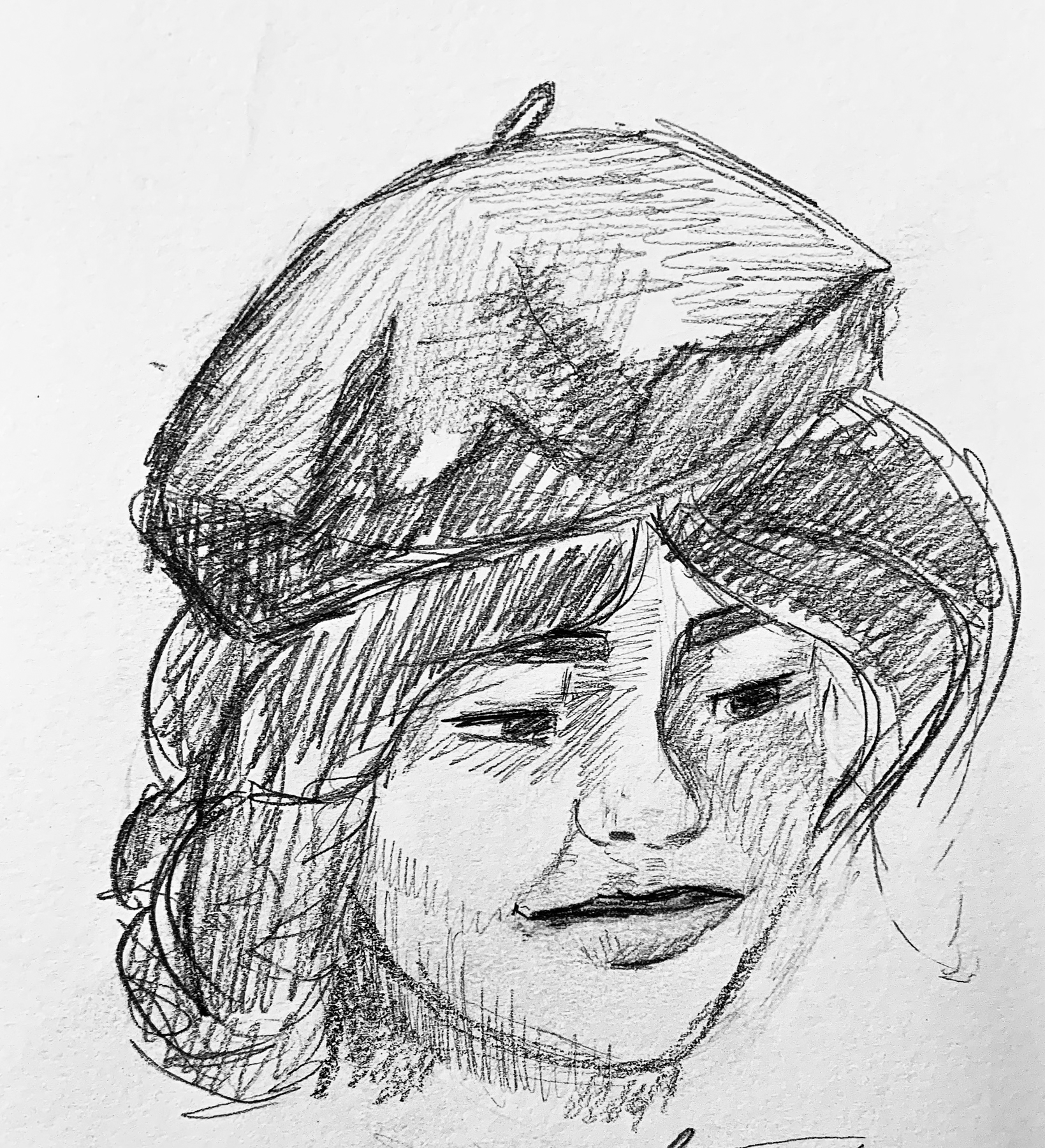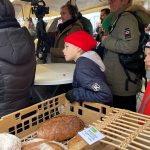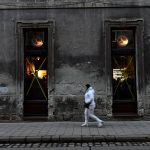Drawing by Kathleen Parker.
CREATIVE PROJECT CURATED BY KAMI L. RICE
One fall night last year, we created a project for ourselves. The American students were studying abroad in Paris, and I was a mentor in their program. Two artists and three writers, we assigned ourselves homework: We’d spend an evening all together at one of Ernest Hemingway’s famous haunts. The writers had to choose someone, or someones, from among the clientele as their inspiration for a short story. The artists’ drawings would be similarly inspired by someone who was there that night. We’d package the works together and discover what we’d jointly created.
–Kami Rice, editor
Tuesday After French Class
By Hailey Small
Katherine knew she was in trouble when she failed French 101 the first time. By the third failed exam—third late-night study session, third two-hour test, third big, red, failing grade—it felt like a sick joke. Four hours of class, four days a week, wasted, and €3,000 down the drain.
“I don’t even really care about not passing, like really, at this point it isn’t even a surprise.” As she hurried up the shaded boulevard that evening, tweed skirt shifting around her knees, Katherine spoke to Rachel with the shrill strain of an overcompensating American. They were walking to the usual place, Café de Flore, where they celebrated another week in Paris every Tuesday night. “You have an easier time than me because you’re British. You basically grew up here.”
“You know, Britain and France aren’t really that close.”
“It at least has to help your accent or something. And, like, the proximity to French culture.” Rachel laughed as they turned the corner. But Katherine wasn’t trying to be funny.
Katherine and Rachel met during their first round of French 101, but after Rachel passed the first exam and moved to higher levels of French class, she started inviting her new, better-at-French friends along. Katherine listened to—and often ignored—the increasingly French conversation. The small, italicized English on the menu was a mocking crutch, and Katherine learned to let the others order wine for the table.
“Bonsoir!” Katherine waved—at least she knew France’s standard “good evening” greeting—and pulled out a chair across from Yannick, who was new to the dinner group. Rachel ordered a bottle of white wine as Katherine and Yannick introduced themselves, leaning across the table through the terrace’s bustling noise to hear each other better. Yannick explained that he was originally from Germany and spoke fluent German, English, and Spanish. He was older, probably early 50s, and gray curls poked out from under a fedora.
Halfway through Katherine’s salmon salad, Yannick asked Katherine how long she had been studying French. It was an innocent question, but Katherine was sick of answering it. Always with these dinner parties, all these world travelers, all these stories from all these interesting countries, and nothing better to talk about than their language classes.
“I don’t know, maybe eight, nine months?” Katherine squinted off down the street, deflecting. She knew Yannick could do the math.
“Wait, if you’ve been studying French that long, you must be in our class. We’ve been in the same class this week and I haven’t noticed you?”
“I don’t know what to tell you.” Katherine flashed a tight smile. She knew how this conversation would go. She would explain that she hadn’t passed the lower-level class; he would give her the same look Rachel gave her every time she explained that she had failed again, that mix of confusion and pity, and then he would offer study tips and halfhearted encouragement, and then, always, the seconds of awkward silence. It wasn’t worth it. Katherine suddenly decided that it was better to leave than sit and explain.
“Rachel, do me a favor, pay my share and text me what I owe you.” And with that, Katherine stood, leaving her almost full glass, and crossed the street. Without thinking, she walked herself to the Monoprix and bought a seven-euro jar of American peanut butter at the self-checkout kiosk. As Katherine walked home, she was overwhelmingly aware of the fat, gray pigeons, the traffic, the way the streets smelled vaguely of urine. Even the pretty things—the stone buildings, the houseplants on terraces, even the clothing for sale in Monoprix—were bragging and imposing. Katherine knew that she could not claim these things. She was living in a place that wasn’t home, floating through a country that wasn’t hers, past people she couldn’t speak to.
Finally, she climbed up the eight flights of stairs to her claustrophobic apartment. There, she sat on the warped wooden floor and ate spoonfuls of peanut butter straight from the jar, listening to the honking and swerving of traffic float in through her only window. In the hot room, the breeze wrapped around her shoulders like a bubble. As French vocabulary sifted through her mind, she watched the evening light filter into the room, slowly shifting from yellow to orange to blue.
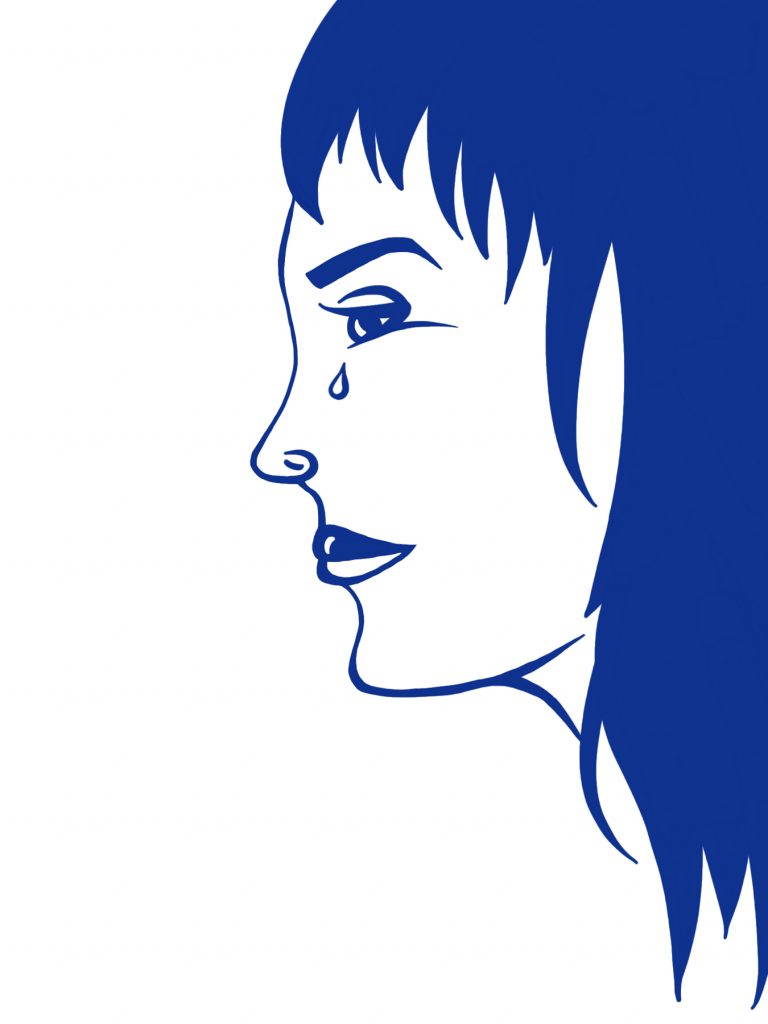
Image by Elaina Gregory.
The Woman in the Yellow Beret
By Kami Rice
The classic beret in this season’s mustard yellow suited her. Managing to look like a local who was long-accustomed to wearing the traditional cap, rather than just another Paris-enthralled tourist who’d purchased it along with Eiffel Tower key rings, she’d perched the fall color on the back of her head. Dark brown bangs parted in a V over her wide forehead. Blond highlights warmed the hair flipping out in short waves around the cap’s felt edges, framing her wide, pleasant face, apple-plump cheeks, and dark eyes, a tableau that hinted at her Indonesian ancestry.
In contrast to the fashionable beret, the fashionable smoking was not her favorite part of this gig, she reflected for not the first time as she brought her cigarette once again to her lips, inhaling then exhaling the putrid stuff, smiling and miming engaged interest as Bastien, beside her facing street-ward as is the custom in Paris cafés, described his latest drama. Sometimes during these long café hours, she also mimed the mouth-ward movement of the tobacco stick without actually drawing the poison into her lungs.
If only poison could always so easily be avoided.
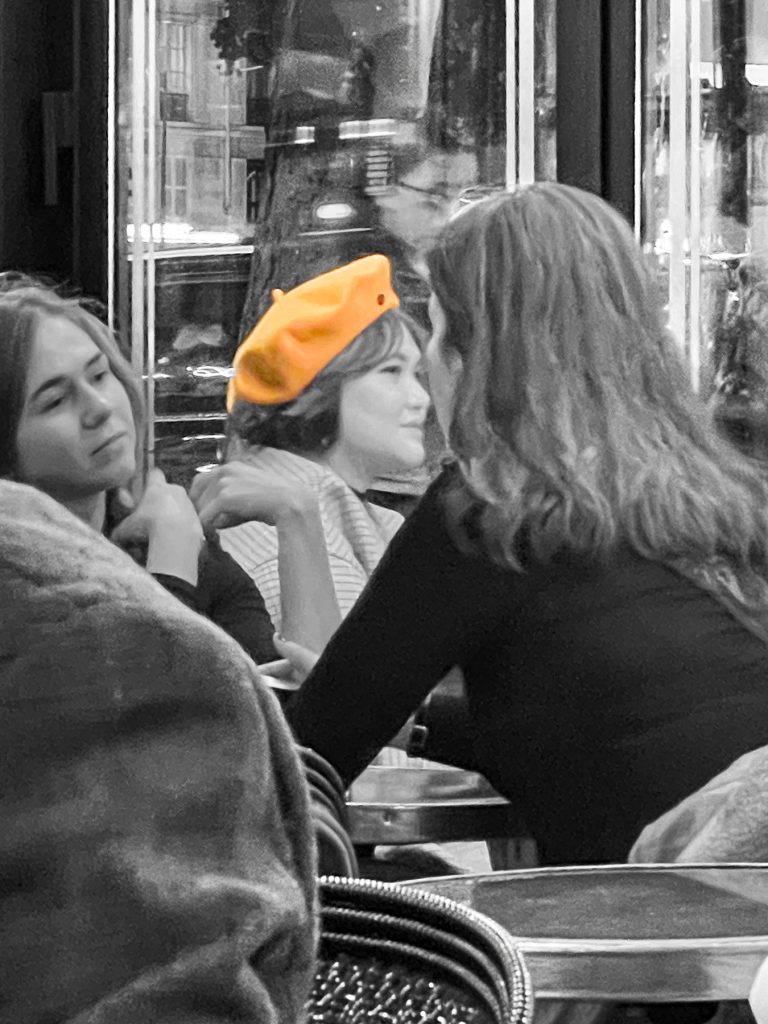
She’d worked hard to nonchalantly become a fixture in this café that legendary literary luminaries had frequented in bygone days. The white-aproned waiters knew her as Margaret, smiling at her above their black bowties and vests with genuine warmth as they wound from table to close-set table. To be honest, though, despite what tourists like to say about the snobbishness of the city’s professional waiters, she actually observed very little lack-of-warmth on their part, even toward the most boorish customers who made no effort to politely play the roles that were theirs in this repetitive piece of café theater.
Speaking of theatre, time to return her attention to Bastien with a sympathetic hand on his arm, leaning forward in feigned interest, eyes round, “He did what?”
And that’s all it took for him to continue dominating the conversation with a sordid tale, or so he thought, about the latest slight he’d experienced. At last night’s vernissage, the gallery owner had rebuffed him, pretending not to hear his offer and instead selling Bastien’s favorite painting to a rival collector. Though he appeared casually confident in his always-black tenue that contrasted so starkly with his pale skin and light blond hair, Bastien’s internal foundation was most definitely built of sand rather than any sort of stable stone. He’d inherited Dad’s money and was still trying to prove—to himself as much as anyone else—himself capable of being a self-made man too, despite the very large leg up.
Mostly, though, Bastien was just a prop in her story, giving her cover to be in place for the moment when Georges would arrive. Or rather “Georges”—one day she would take up the challenge of finding out his real name and backstory.
Earlier, well before she and Bastien were scheduled to meet, she’d lingered across the street as late-autumn dusk quickly turned fully dark. She’d pretend-smoked beside the brightly lit, affectedly sparce window dressings of the Emporio Armani waiting for this seat beside the door under the outdoor awning to free up. Even on a drizzly evening like this one, the tiny, round tables outdoors offered coziness, though of course “coziness” was not her primary concern this night.
As Bastien droned on, he barely noticed when Georges approached and stooped for a quick faire-ing of les bises, kissing both her cheeks rapidly—just a pause along his rushed path inside, in the way of acquaintances who must acknowledge each other, because they’ve clearly been seen, but who don’t merit interrupted conversations and introductions to each other’s companions.
Georges never faltered as he swiftly slipped the packet into her still-damp peacoat pocket. This was what she was really here for. And now she just needed Bastien’s story to come to a breaking point so she could make her polite excuses and get away before anything could go awry.
Her cigarette exhausted, she played with the stem of the Bordeaux in her other hand, twisting it, watching the light play off the glass, the deep red-violet liquid inside, the wet leaves on the sidewalk in front of the café, the shallow puddles in the street.
Light.
That was what this packet now weighing down her pocket was all about.
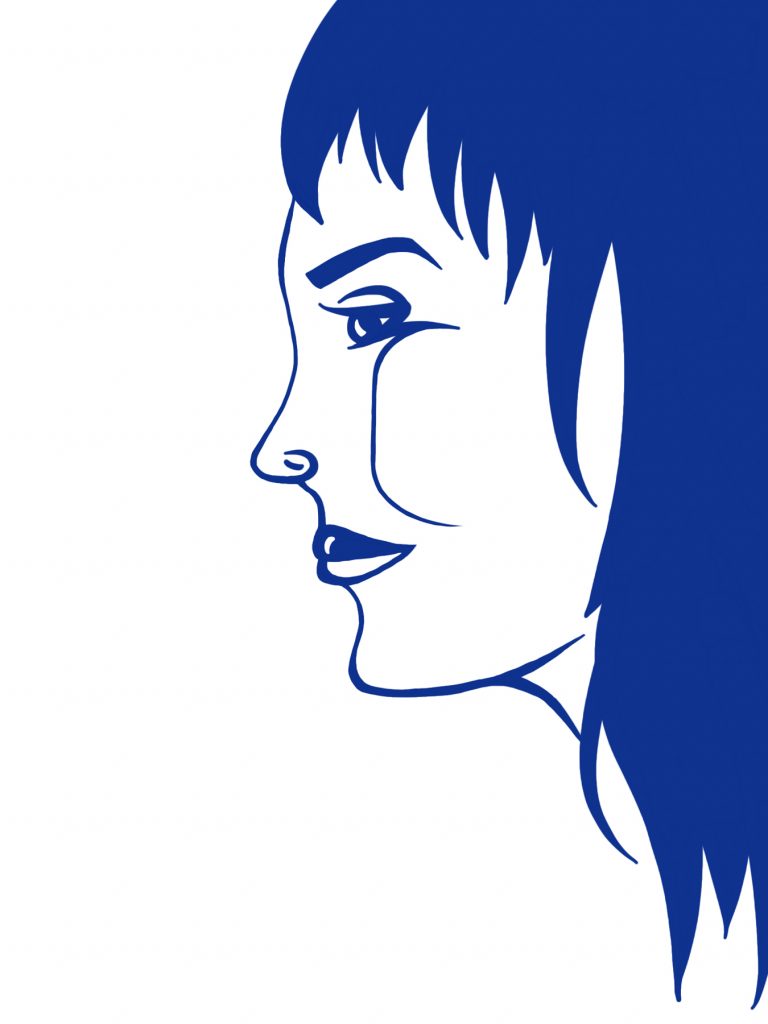
Image by Elaina Gregory.
All the Time in the World
By Emily Birks
It had been a slow, leisurely Tuesday in Paris. They had woken up late, each in his own room. Frederick had finally phoned him around eleven, after getting dressed and checking his watch for the third time. Brutus had already been up for an hour, of which he spent almost 30 minutes watching a pigeon outside. The two men had then collided for lunch at the café near the hotel, which they both agreed was quite unimpressive considering the prices. Frederick commented on how his bœuf bourguignon compared to his wife’s Sunday roast, and Brutus watched the rain slide down the window. He was an observant man, yet he supposed nobody noticed his constant state of distraction.
Over lunch they discussed the weather and their plans for the day, taking long breaks between bites and soaking in the Parisian ability to waste time. Frederick found an extra button for his coat in his pocket and left it on the bill.
They strolled through a park, as best as strolling could be with two smooth wooden canes. It was somehow nearly four, and they had accomplished barely anything at all; but that was beside the point. Brutus poked at some pigeons with the tip of his cane and thought about the one he named Eddy near his hotel room. The pair found a worn, green bench and settled down, thankful they had chosen to wear turtlenecks on such a brisk October day.
Later, in a nearby arrondissement, they peered through patisserie windows and poked their heads into a few antique shops. Frederick picked out a few golf balls and a nice glass from an Irish brewery he had never seen before. Brutus knew his wife would practically behead him if he brought any more tidbits home. She had scolded him three nights in a row before his flight, and he was sick of hearing it. He did, however, find a nice box of cigars in a narrow shop on Rue de Rennes and decided she wouldn’t notice. Frederick demanded he share when they returned to Edinburgh, and received only a subtle nod from Brutus. He knew that was a yes.
By late evening, they realized they had spent numerous hours exploring the city without stopping for a second bite to eat. Frederick asked if Brutus minded stopping at Café de Flore, and Brutus recalled they had one of his favorite croque monsieur recipes. He also agreed that the chips would pair quite nice with a dry glass of pinot noir. So they turned toward the white awnings and evergreen tables, eyeing a spot against the wall. Frederick commented on what a great choice this was, and they waited patiently for their food to arrive, though they were both ravenous. The waiter came back multiple times to fill their wine glasses, which they drank with much thought. Brutus brought his eyeglasses down from his bald head and complained about an issue from the days of university. He was reminded of his old rugby uniform by the colors of the chairs, and a taste of nostalgia joined their meal.
After their meal, they lingered for a while, pushing off thoughts of tomorrow’s train while winding down memory lane. Frederick wished Lucy was here with them to recall their time together at uni before their son Gregory had come along.
Brutus and Frederick leaned back in their café chairs, letting time roll by as they enjoyed their last pools of wine. It had been many years since a Tuesday night meant anything to them; at this point all the days rolled into one long day. So why rush? There is all the time in the world at Café de Flore.
Brutus ordered a cup of tea, the perfect way to settle down after a good meal. He wouldn’t let the French stop him from enjoying a good cup of English Breakfast. After a few attempts to open the package, his clumsy fingers finally pulled the bag out and rested it in the cup. After it steeped, he took a sip and asked Frederick what he thought of the final race on Sunday. It had been a jolly good time, as was every year in early October. They had been coming to Paris for the Prix de l’Arc de Triomphe for over 40 years, and nothing had ever stopped them, except for the pandemic ridiculousness of last year. They agreed they’d had another successful weekend, as their pockets had not suffered, and the festival had celebrated the 100th anniversary with some fantastic champagne.
Most of the tables had cleared by the time they finally emptied their cups and paid the bill. Frederick cautiously checked his watch, cleared his throat, and conveyed that it was much later than he realized. Over his glasses, Brutus looked at him reprimandingly and stuffed his wallet deep into his coat pocket. A slight drizzle had again begun to settle on the pavement and humidify the air. The pair slowly shuffled out of their seats and reunited themselves with their canes, preparing for the slickness of the walk back to the hotel. They nodded to their waiter as he held open the thick glass doors. Yet, despite the hour, there was no rush.
After all, they had all the time in the world—it was just a Tuesday.
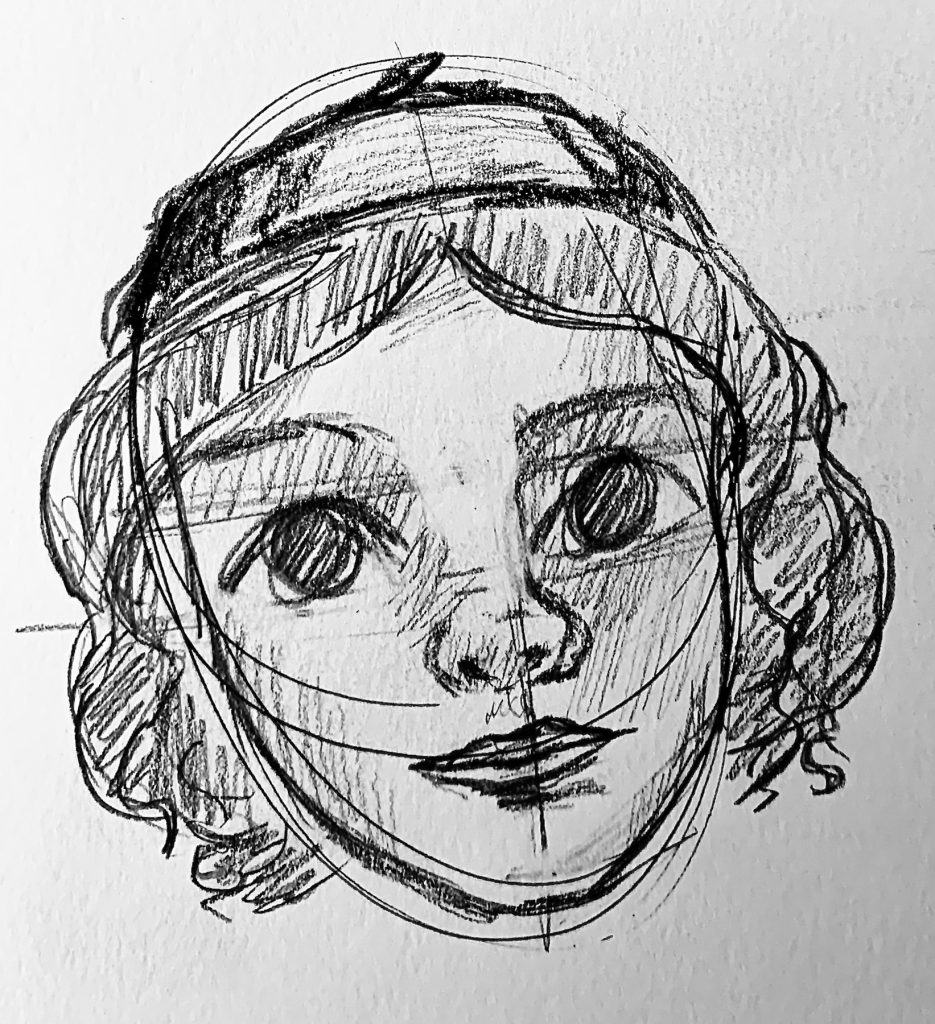
Drawing by Kathleen Parker.
Hailey Small is a writer and student working towards a B.A. in English at Asbury University, where she is the editor-in-chief of The Asbury Review. Find her work there, on The Sundress Blog, or elsewhere on Anthrow Circus.
Emily Birks is an undergraduate student at Wheaton College in Wheaton, IL. She grew up in the Chicago suburbs and has had a passion for writing since she was little. Emily wants to be an author someday, but for now she enjoys reading, drinking coffee, and shooting photographs on film when she is not studying.
Kathleen Parker is a senior at Wheaton College studying English and Art History. She is graduating this spring and hopes to attend divinity school with a focus on theology and embodiment in the arts.
Elaina Gregory is a senior at Trinity Christian College, studying graphic design and entrepreneurship. She plans to have her own business one day, filling commissions for web and app design along with photo shoots. She currently helps a local café with marketing while also working as a barista.
Kami Rice, Anthrow Circus’s editor, plies her insatiable curiosity from a base in northern France and from perches in coffeehouses, cafés, and friends' homes the world over. As a freelance journalist, she has reported for the Washington Post, The Telegraph, The Tennessean, The Bulwark, and Christianity Today, among many others. Her more creative work has appeared in Another Chicago Magazine, The High Calling,and Washington Institute's Missio.Her French to English translation has been published by Éditions Beaux-Arts de Paris. She also edits manuscripts and articles for a variety of clients and loves learning about the lives of regular, real people wherever she finds herself.

